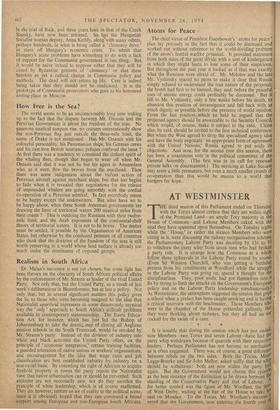Atoms for Peace
The chief virtue of President Eisenhower's ` atoms for peace' plan lay precisely in the fact that it could be discussed and worked out without reference to the world-dividing problem of the atom's fearful warlike potential. It provided statesmen from both sides, of the great divide with a sort of kindergarten in which they might learn to lose some of their suspicions. But throughout the past year it looked as if that was exactly what the Russians were afraid of. Mr. Molotov and the late Mr. Vyshinsky spared no pains to make it clear that Russia simply refused to understand the true nature of the proposal; the bomb had first to be banned, they said, before the peaceful uses of atomic energy could profitably be discussed. But it fell to Mr. Vyshinsky, only a few weeks before his death, to abandon this position of intransigence and fall back with as much dignity as possible before the pressure of world opinion. From the last position ,,which he held he argued that the projected agency should be answerable to the Security Council, 'which wopld, of course, make it subject to the veto. China also, he said, should be invited to the first technical conference. But when the West agreed to drop the specialised agency idea and have the body negotiate ` an appropriate form of agreement with the United Nations,' Russia agreed to put aside its objections. And now, for the second time this session, there has been a unanimous vote in the political committee of the General Assembly. (The first was in its call for renewed private talks on disarmament.) The rejoicing at Lake Success may seem a little premature, but even a much smaller crumb of co-operation than this would be manna to a world that huggers for hope.










































 Previous page
Previous page